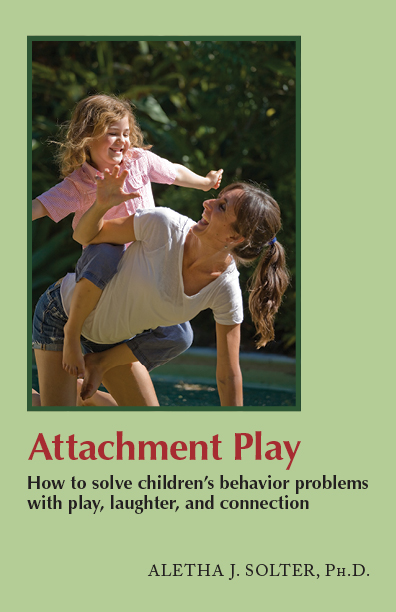Bedtime problems with three-year-old
by Aletha Solter, Ph.D.
Question:
My son is 3 1/2 years old and still takes naps. He goes down beautifully and we usually wake him up after two hours. Once or twice a month, he doesn't fall asleep, and after about an hour he says he's done sleeping. We then let him get up. Lately, when we put him to bed at night around 8:30, it is not unusual for him to still be awake at 10:00. He also tends to throw tantrums during this time. This is made more unusual because during the day he rarely throws tantrums. Should we stop giving him naps, even though he usually takes them with no problem? We thought he would refuse naps more and more, and then we would know he doesn't require them anymore, but this hasn't happened. Please let us know what you think.
Answer:
Adult expectations for children's sleep schedules vary greatly from culture to culture. There is no right or wrong way. Your son would fit very nicely into the Spanish or Italian culture, where adults and children take long naps in the early afternoon, and then stay up fairly late at night. In these cultures, it is quite common to see young children wide awake at 10 or 11 o'clock in the evening. On the other hand, in England, many parents put their young children to bed at 6 or 7 o'clock in the evening, and then eat their evening meal after the children have gone to bed.
Some children stop needing a nap as early as their second birthday, especially if the parents encourage an early bedtime. Others continue to take long naps, but then stay up later at night. You can ease your son into a schedule to fit your lifestyle. If you want him to go to sleep earlier at night, you can try to keep him up during the day and not suggest a nap. (It may take several days for him to adjust to this.) However, if he becomes too tired with this system, then he is probably not yet ready to give up a nap. When he does take a nap in the afternoon, he will naturally tend to stay up later at night, as you have observed. If your son is not tired, it makes little sense to force him to stay in bed. Read to him or let him play until he shows signs of sleepiness. You can then suggest that it is time for bed, and you can offer to stay with him until he falls asleep.
Your son's evening temper tantrums have several possible causes. If you put him to bed before he is tired, and expect him to stay alone in bed, this may cause him to be frightened, frustrated, or angry. If you show impatience with him during this time, he will become even more distressed. Keep in mind that new fears begin around three years of age when children become aware of death, and it's normal for young children to resist being left alone at bedtime. That's why I recommend staying with your son until he falls asleep.
Accumulated stress can also cause evening tantrums. Look for all possible sources of stress in his life, not only at bedtime, but during the day as well, and try to reduce stress as much as possible. Crying and tantrums are important stress-release mechanisms for pent-up emotions. Many children need to have a good, releasing cry or tantrum before they are able to relax and fall asleep. This is healthy and normal. You son may find a minor pretext to cry about. For example, his favorite pajamas are in the laundry, or you bought the wrong kind of toothpaste.
Children need to know that they are loved no matter how they are feeling. Your son will feel safe and loved if you offer empathy and connection while he cries or rages, just as you yourself would want to be treated if you needed to cry after a hard day. He is not trying to manipulate you. Accept whatever pretext he has chosen to cry about, and just listen until the tantrum has run its course. He will probably then be able to relax and fall asleep.
About Aletha Solter:
Aletha Solter, PhD, is a developmental psychologist, international speaker, consultant, and founder of the Aware Parenting Institute. Her books have been translated into many languages, and she is recognized internationally as an expert on attachment, trauma, and non-punitive discipline.
Aware Parenting is a philosophy of child-rearing that has the potential to change the world. Based on cutting-edge research and insights in child development, Aware Parenting questions most traditional assumptions about raising children, and proposes a new approach that can profoundly shift a parent's relationship with his or her child. Parents who follow this approach raise children who are bright, compassionate, competent, nonviolent, and drug free.
For more information about the topics of bedtime and tantrums, see Aletha Solter's books, Cooperative and Connected, Tears and Tantrums and Attachment Play


